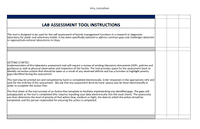
Languages: English, Arabic, French
The GU Self Lab Assessment Tool (S-LAT)
[GU S-LAT]
The Georgetown University (GU) Self Lab Assessment Tool (S-LAT) can be used for the self-assessment of biorisk management functions in a research or diagnostic laboratory and for public and veterinary health facilities. This document contains targeted approaches to address challenges observed in regional/sub-national laboratories and was adapted from the World Health Organization (WHO) Laboratory Assessment Tool (2012). The tool focuses on the systematic analysis of laboratory infrastructure and equipment, administration and training, biorisk management systems, specimen collection, handling, transport and referral and waste management.
SUMMARY
The Georgetown University (GU) Self Lab Assessment Tool (S-LAT) targets the self-assessment of biorisk management functions in a research or diagnostic laboratory and for public and veterinary health facilities. GU worked to adapt the World Health Organization (WHO) Laboratory Assessment Tool (2012) and create its own self-assessment approach with traditional models of capacity strengthening to address challenges observed in regional/sub-national laboratories. The tool incorporates assessment of laboratory infrastructure and equipment, administration and training, biorisk management systems, specimen collection, handling, transport and referral and waste management. The S-LAT also automatically generates an action plan for users as the tool is electronically completed. With a purpose to promote and assess biorisk management best practices at an institutional level, the tool works to reduce the safety and security risks associated with biological agents. Laboratory personnel are able to complete the S-LAT and analyze which components are best for assessing the capabilities of their labs.
This tool was created by Dr. Erin M. Sorrell, Dr. Claire J. Standley, Lauren Miller, and Alexander Linder with support from the U.S. Department of State’s Biosecurity Engagement Program. The Elizabeth R Griffin Program at the Center for Global Health Science and Security at Georgetown University authored this resource as part of its mission to promote evidence-based biosafety and biosecurity practices. The Center for Global Health Science and Security conducts original research to help decision-makers worldwide build sustainable capacities to prevent, detect, and respond to public health emergencies. The S-LAT has been piloted in laboratories in Morocco and Libya and it is available in English, French, and Arabic for free online.

..png)
